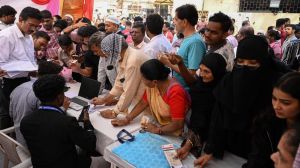Stay updated with the latest - Click here to follow us on Instagram
Down But Not out
Special school grooms children with Down syndrome and other mental,physical challenges to depend less on others,lead a normal life and find employment.
The transformation is striking,as her timid,lost expression gives way to a confident look as the familiar tunes of Kolaveri Di plays in the background. The 13-year-breaks into a dance but as she tries to co-ordinate her movements,there seems to be something amiss. Her steps do not match the rhythm despite her huge effort.
The woman in the background explains,She suffers from Down syndrome.
Komal Gadve is just one of the many special children who attend this school in the heart of Navi Mumbais Kopar Khairane area. Located in sector 7,Asmita Special School has been teaching such children since 1998. The school,started in a room in Turbhe,was later shifted to a bungalow in Kopar Khairane,which doubles up as a school and a daycare facility for these children,some of whom them from very poor families.
We started with 13 students and now have 45. We are now officially recognised by the Government of Maharashtra, says Manda Karande,founder trustee and principal of the school.
The school caters to children who suffer from autism,Down syndrome and children who are differently abled. The school charges students a nominal fee of Rs 200 per month,which is waived if parents cannot pay it. A donor is then sought by the school so that children can be taught activities to help them depend less on others in their daily chores.
The children who come here belong to low-income households. While parents of some kids are vegetable vendors or autorickshaw drivers,parents of others are daily wage workers. The common factor for all these children is that their condition makes them slow learners and some have IQ levels as low as 20-34, says Karande.
The school functions from 9.30 am to 3.30 pm Monday to Saturday. A minibus received as donation is used to ferry kids between their homes and the school.
While Karande admits that the work is difficult,she says there are people who support the institution.
I have 11 people who help me run the institution. They have to be paid their dues. Fees are an option and there are students who do not pay. We have a few donors but there are many expenses that have to be met. We run short of funds many a time. We are hoping that people realise that institutions like ours need all the help and support so that we can help these children lead a normal life, Karande says.
The children have a monthly medical check-up and doctors are called in to check them for ailments. A dance teacher and a physiotherapist are also called once a week. The institution also performs an IQ test for the children at government-run hospitals. The children are taught alphabets,numbers and names of fruits and vegetables. Karande says that while some children can be trained to know their surroundings and take up jobs that do not require a high IQ,others can be helped to become self reliant. These children can be trained to be helpers at convenience stores and office assistants. Some of them suffer from handicaps and cannot walk. These children can be taught skills like eating food by themselves and maintaining hygiene. All these are taught here, she says.
One of the children,Sohel Shaikh (15),who lives in Ghansoli,walks towards Karandes desk,a puzzled look on his face,as she gives him a smile. Pointing at us,he asks Who are they? Karande explains.
He smiles and says. I have just learnt about vegetables and body parts and know numbers from 1-50. I want to be a police officer one day so that if any policeman stops the bus I will be able to tell him to let the bus go.
Karande reveals that Sohels IQ is in the 20-34 range. He has improved and can now talk confidently with others, she says.
While Sohel speaks with a sense of determination,there are some children who try their best to talk but cant be understood. Fourteen-year-old Jatin Suryavanshi,whom doctors have called a slow learner and is speech impaired,tries to talk. Ask him where he lives and he replies in monosyllables that cannot be understood. Karande reveals that Jatins father has deserted the family and his mother is his only relative. With finances being limited and more often than not,unavailable,Jatin seems to find solace in the fact that he has friends,she says.
The going is difficult but teaching these children is our service to God and our way of giving back to society. This is our job,they are our life, Karande says.
As you make your way to the door and bid the kids adieu,Prathamesh Kute (5),blocks the path. Prathamesh suffers from Down syndrome and has been classified as a slow learner by doctors. Trying his best to avoid eye contact,he asks,When will you be back? The answer soon seems to be one he agrees with. He steps away and sits in a corner,waving good-bye. His eyes meet yours for a split second,before he turns away,oblivious of others in the room.







